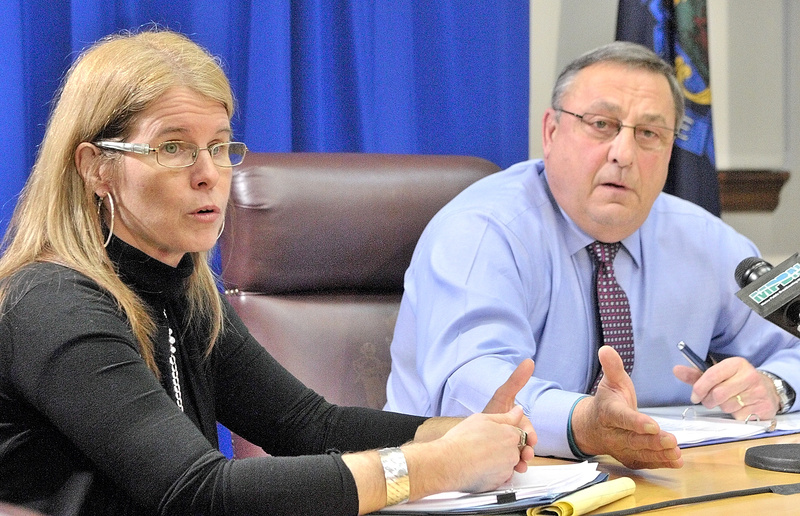AUGUSTA — Six months ago, John Wilson could no longer manage his HIV and his cancer.
He was going to the hospital emergency room for help and was in danger of being evicted from his apartment in Lewiston, he said.
On Thursday, Wilson, who’s 40, told Maine lawmakers that his life turned around after he was introduced to a state-funded case manager, who helped him keep his apartment and get medical care. “Literally, she saved my life,” he said.
For the second day in a row, Mainers who rely on state support flowed through the State House to testify about the potential effects of proposed budget cuts totaling about $220 million over the next 18 months. Lawmakers will continue to take testimony today, and will begin discussing Gov. Paul LePage’s proposed supplemental health and human services budget next week.
Wilson was among those who urged lawmakers to spare case managers from the cuts.
Others argued against cuts in MaineCare health insurance for low-income adults and cuts to non-medical institutions where thousands of Mainers live and get care for dementia, mental illness or drug addiction.
Speakers repeatedly told the Legislature’s Appropriations and Health and Human Services committees that the state spending cuts would only end up filling emergency rooms, shelters and prisons, and cost more in the long run.
LePage, meanwhile, held a news conference down the hall Thursday afternoon to respond to the steady stream of criticism aimed at his supplemental budget for health and human services.
“The fact of the matter is, we are spending more money than we have,” he said.
While the cuts are painful, they are necessary to close a budget deficit that will otherwise grow larger and affect even more people, he said. LePage also repeated his argument that the cuts would bring Maine more into line with other states.
“We are far more generous than most other states in the nation,” he said.
LePage rejected the suggestion of some who testified in favor of raising revenue to close the shortfall, such as with an added tax on beer or by rescinding tax cuts passed earlier this year.
“Tax increases, in this economy at this time, will cost an enormous amount of jobs,” he said.
He acknowledged that the reduced state funding would eliminate some health care jobs, but he could not say how many. One group that opposes the cuts has put the number of lost jobs at 4,400.
LePage said he plans to ask the Legislature to speed up state deregulation of health insurance to help people who would lose MaineCare coverage afford private health insurance.
He also said he will seek authority to work with the Maine State Housing Authority to provide housing for people who now are in group homes and nursing facilities that will lose funding in June if his budget passes.
Wilson was one of many who spoke about the value of case managers who keep tabs on seriously ill or homeless clients and connect them to medical and social services.
Genia Graham, who is 49 and has HIV/AIDS, told lawmakers that she would have become a burden on the medical system, and died, if not for her case manager.
“You can pay to keep me alive and be a productive member of society, or you can pay for me to die in hospice care,” she said.
The loss of case managers could have a big impact in Portland, where a team of state-funded managers helps move families and adults out of emergency shelters, said Robert Parritt, director of the city’s Oxford Street Shelter.
Case managers moved 440 families out of the shelter last year, helping them find jobs and apartments so they no longer rely on aid from the city and state.
“The cost savings to the community and in particular the property tax base is extremely significant,” Parritt said.
The city won’t be able to keep the team of case workers if the state funding is cut as proposed, he said. “I predict that shelter numbers would increase drastically,” Parritt said.
Other large communities with homeless shelters would see the same increases, said Cullen Ryan, executive director of Community Housing of Maine and a member of a statewide council on homelessness.
“What we’re talking about is throwing people out into the community and into homelessness,” Ryan said.
Several men and women who are recovering from drug addiction urged lawmakers not to cut MaineCare eligibility and funding for private non-medical institutions. Several treatment agencies in the Portland area, including the Mercy Recovery Center in Westbrook and Crossroads in Portland and Windham, have said they would have to close next year without the money.
“I honestly don’t know where I’d be without residential treatment,” said Felicia Warford, who is recovering from addiction at Crossroads in Portland and is pregnant with her second child. “This disease, it kills people.”
The closure of the Mercy center would also end its program focused on treating pregnant women and reducing the chance that their babies will be born dependent on opiates, said Michael Gendreau, vice president of mission effectiveness at Mercy Hospital in Portland. “The cost of just one (drug-affected) baby in the neonatal unit can run into tens of thousands of dollars,” Goudreau said.
Speakers also attacked the proposed elimination of MaineCare coverage for an estimated 18,000 adults without children.
Chuck Smithson, 42, a self-employed carpenter from Portland, said he could never afford private health insurance and simply avoided doctors for many years. He wrapped cuts in electrical tape rather than get stitches, he said, and “once even pulled a 16D nail out of my own left hand after shooting it with a nail gun.”
He ate aspirin “like candy” and kept working, he said.
Earlier this year, he became depressed and had a hard time working and keeping up with rent and expenses. Because the recession has reduced his earnings to less than $10,800 a year, he qualified for MaineCare. He has been seeing a counselor for his depression and is working and paying his bills, he said.
“(I) have no intention of being a public assistance lifer,” Smithson told the lawmakers. “The benefits that I receive are critical to helping me live and, ultimately, contribute to the community.”
Opponents of the cuts to MaineCare eligibility warned that federal law prohibits eliminating eligibility for many people before national health care reform takes full effect in 2014 and provides alternatives.
LePage and officials in his administration insisted Thursday that they can make the cuts by getting a federal waiver. But, they said, the federal government will give the waiver only if the Legislature supports the changes.
Mary Mayhew, commissioner of the Department of Health and Human Services, said the state won’t risk losing federal matching funds, and will maintain existing services if waivers aren’t granted. It’s not clear what LePage would propose as an alternative to close the shortfall.
While overwhelmingly outnumbered, some Mainers did come to the State House to support LePage’s proposed cuts.
The DHHS budget is not sustainable, said Gary Maheux of Waterville. “Proponents of these expanded entitlements have no viable solutions that will address the root cause of this shortfall, which is a bloated welfare system that Maine taxpayers cannot afford,” he said.
More than 110 people spoke during Thursday’s day-long hearing. About 150 spoke on Wednesday.
LePage is urging lawmakers to vote on his budget proposal by the end of January so that cuts can begin in April.
Staff Writer John Richardson can be contacted at 791-6324 or at:
jrichardson@mainetoday.com
Send questions/comments to the editors.




Success. Please wait for the page to reload. If the page does not reload within 5 seconds, please refresh the page.
Enter your email and password to access comments.
Hi, to comment on stories you must . This profile is in addition to your subscription and website login.
Already have a commenting profile? .
Invalid username/password.
Please check your email to confirm and complete your registration.
Only subscribers are eligible to post comments. Please subscribe or login first for digital access. Here’s why.
Use the form below to reset your password. When you've submitted your account email, we will send an email with a reset code.